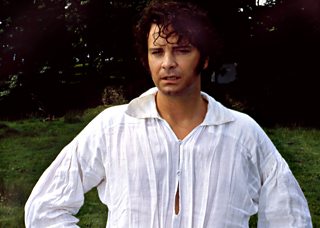Seven of literature's lustiest lovers
“How peaceful life would be without love,” wrote Umberto Eco in The Name of the Rose, “how safe. How tranquil. And how dull”. Endless books have been written about love – finding it, managing it, controlling it, escaping from it... But what about lust? It’s a hulking, sulking emotion, smirking from the corner of our brains. Let’s have a little look at some of literature's lustiest characters.
Tom Jones in The History of Tom Jones, a Foundling (1749)
Henry Fielding, in the lust-fest that is The History of Tom Jones, a Foundling, talks about “the glorious lust of doing good” but in the meantime, manages to squash in a fair bit of the other kind as well. Fielding describes what is “commonly called love”, as being, in reality, good old-fashioned lust, or “a voracious appetite with a certain quantity of delicate white human flesh… This is indeed more properly hunger”. Sounds more like cannibalism but we take the point.

The Summoner in The Canterbury Tales (1478)
Geoffrey Chaucer’s Canterbury Tales are jam-packed with lust. The Wife of Bath says her lusty feelings are all the fault of the gods while the Miller’s Wife focuses entirely on sexual rivalry. The Summoner, meanwhile, abuses his position: “He had the young wenches of the diocese under control, at his own wish, and knew their secrets, and was their sole advisor.” We’re amazed they got to Canterbury, frankly.
Lydia and Kitty Bennett in Pride and Prejudice (1813)
Surely the quivering fans and arched eyebrows of Jane Austen’s work wouldn’t descend to lust? Generally, they don’t. A gentleman’s £13,000 a year and home in Hampshire seems to set more hearts beating than a well-turned leg, but that’s until we get to Lydia and Kitty Bennett, who are SHAMELESS in their lusty following of the Meryton garrison. If you squint through Austen’s disapproving but very funny descriptions of their incredibly unsubtle attempts to attract the attentions of Wickham et al, we see two young girls basically following a boy band around and screaming “get them off”.
The senior demon Screwtape in The Screwtape Letters (1942)
CS Lewis works his way through the deadly sins in The Screwtape Letters, and is particularly savage about lust, describing young male desire as having a dark side that requires a partner in sin. “the felt evil is what he wants; it is that 'tang' in the flavour which he is after. In the face, it is the visible animality, or sulkiness, or craft, or cruelty which he likes, and in the body, something quite different from what he ordinarily calls Beauty...”

Pop Larkin in The Darling Buds of May (1958)
The Larkins, in HE Bates’ The Darling Buds of May, are no strangers to lust, but there’s no shame here. It’s happy, healthy and you’re never too old for it (which is what led TV viewers to the startling sight of David Jason as Pop Larkin drinking champagne in the bath with Ma in the television adaptation). Whether it’s Mariette putting poor Charley off his tax return with her seductive glances or Pop Larkin cheering the lovelorn of the village up with a few cocktails and a cuddle, lust is in the air.
Alexander Portnoy in Portnoy’s Complaint (1969)
We're heavily into religious guilt territory here. Philip Roth's anti-hero, Alexander Portnoy, is a textbook case of the self-perpetuating cycle of lust and guilt creating more lust and more guilt. His obsession with his sexual partner “the Monkey”, his horror at his own behaviour, his desire to control his own lustful thoughts, make this one of the cruellest and funniest novels of the 20th Century. Every adolescent should read it. As they also should read...
Adrian Mole in The Growing Pains of Adrian Mole (1984)
“I allowed Pandora to visit me in my darkened bedroom. We had a brilliant kissing session. Pandora was wearing her mother's Janet Reger full-length silk slip under her dress and she allowed me to touch the lace on the hem. I was more interested in the lace near the shoulder straps, but Pandora said, 'No darling, we must wait until we've got our O-levels'.” Do we need to say any more? In between measuring his “thing” and writing lustful poetry to Pandora with the odd political reference thrown in to try and seduce her with his current affairs knowledge, it’s amazing poor Adrian got any O-levels at all.

Plain, straightforward, uncomplicated, tingly, exciting: lust. As Sylvia Plath said, “If they substituted the word 'Lust' for 'Love' in the popular songs it would come nearer the truth.” When we’re in the throes of true lust it can feel like madness, as American satirist Joe Queenan discovers in the Seriously... podcast A Brief History of Lust, which you can download now.
-
![]()
A Brief History of Lust
Joe Queenan presents a new history of lust, from Helen and Paris to Bill and Monica via Rasputin, Edwina Currie and John Major.
More from Seriously...
-
![]()
Fake wine – honestly, it’s a thing.
Here’s what Radio 4 has uncorked about the fake wine industry.
-
![]()
Five Steps to the Creative World of Cosplay
An insight into the world of fictional characters brought to life by devoted fans.
-
![]()
Miles Jupp asks if a woman invented James Bond...
Phyllis Bottome is little known today, but did she inspire Ian Fleming?
-
![]()
Five ways to burst your social media bubble
DJ and presenter Bobby Friction on how to escape the online echo chamber.
-
![]()
The Story of The Green Book by Alvin Hall
A travel guide like no other, for black motorists in the mid-20th Century it was a catalogue of refuge.
-
![]()
Apathy in the UK by Phill Jupitus
The comedian and broadcaster on boredom.
-
![]()
What is a 'curvalicious' body?
Bridgitte Tetteh explores attitudes to female bodies in the black community.
-
![]()
Sitting for David Hockney
Art critic Martin Gayford learns what it's like to be painted by a modern master.
-
![]()
Why having a baby needn’t subdue your inner geek
Five tips from Isy Suttie.
-
![]()
Miles Davis on canvas
The legendary trumpeter's second life as a painter.
-
![]()
Ey Up! It's The Sex Pistols
The Sex Pistols visited Yorkshire twice, but what impression did they leave?
-
![]()
William Shakespeare's America
Robert McCrum traces the Bard's influence in the USA.
-
![]()
Three-Sided Football, A Sport for Anarchist
Ian McMillan watches from the side lines in South London
-
![]()
Why Do Dancers Die Twice?
Should professional dancers careers have to be so brief?
-
![]()
Is Mindfulness Meditation Dangerous?
Jolyon Jenkins investigates whether meditation can do you more harm than good.
-
![]()
Neil Innes on the Bonzo Dog Doo-Dah Band
The band member recalls the anarchistic joy of a truly unique group.
-
![]()
Mary Beard vs Hair Dye
The writer and academic has a consultation with a legendary hair colourist.
-
![]()
The Recovering Addicts who Inspired Trainspotting
The team of recovering addicts who made their mark on cinematic history.
-
![]()
Mao's Little Red Book goes West
David Aaronovitch on how an Eastern political tract became a Western icon.
-
![]()
David Bowie in his Own Words
David Bowie's interviews reveal his humour, passion and determination to succeed.
-
![]()
Dotun and Dean
Broadcaster Dotun Adebayo revisits his youthful obsession with James Dean.
-
![]()
Gavin Esler on The Good Goering
Did Nazi leader Hermann Goering have a brother who saved innocent lives from the Holocaust?
-
![]()
Meet the Burlesque Legends
Mat Fraser meets the former striptease stars back on the stage in their 70s and 80s.
-
![]()
Neil Gaiman's Orphee
A poetic retelling of the Orpheus myth, from the celebrated writer Neil Gaiman.
-
![]()
The Draw of War: Walt Disney and World War Two
Kellie Redmond explores Disney's fascinating contribution to the war effort.
-
![]()
Harry Shearer on New Orleans
The Simpsons star, satirist and actor reflects on the flood that devastated his home town of New Orleans.
-
![]()
Philip Hoare: CSI Whale
The award-winning writer on porpoise dissections, stranded whales and beached dolphins.




























